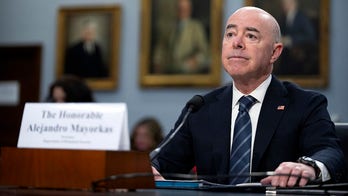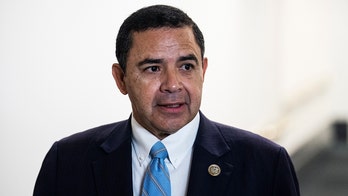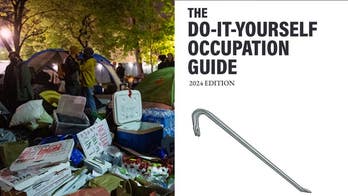Homeland Security Deputy Secretary Elaine Duke says she's optimistic about Congress embracing the Trump administration’s immigration-reform proposal, which she thinks meets the country’s border-security needs, while acknowledging the agency's challenge of having to find the “right mix” of manpower, a border wall and technology.
“I’m absolutely optimistic,” Duke told Fox News on Friday. “It (ends) the search for what this country needs. I think everybody is going to rally around it.”
Among congressional lawmakers to immediately back the administration's framework plan was Trump supporter and Arkansas Republican Sen. Tom Cotton.
“The president's framework is generous and humane, while also being responsible,” Cotton said after details of the plan were made public Thursday.
Still, the plan faces an uphill challenge on Capitol Hill, where some Democrats and Republicans are pushing their own preferred legislation.
On Saturday evening, President Donald Trump expressed his doubts about whether Democrats were interested in border security at all.
"Democrats are not interested in Border Safety & Security or in the funding and rebuilding of our Military. They are only interested in Obstruction!" the president tweeted.
Last week, Congress effectively shut down the federal government for three days after failed to pass a stopgap spending bill tied to Democrats' demands to extend protections for young illegal immigrants.
In a compromise with Democrats that on Monday ended the shutdown, Senate Majority Leader Mitch McConnell, R-Ky., vowed to vote on an immigration bill “so long as the government remains open,” which effectively meant through Feb. 8, when the recently-passed spending bill expires.
The administration’s draft plan largely follows its firmly held “four-pillar” platform that calls for: enhanced border security; protecting immigrants brought illegally to the United States as children; stopping immigrants from bringing parents or other extended-family members into the country; and ending a lottery-based program that promotes diversity by allowing immigrants into the U.S. from underrepresented countries.
In addition, the plan, which is scheduled to officially be unveiled Monday, calls for a $25 billion trust fund to pay for a U.S.-Mexico border-wall system and a path to citizenship for roughly 1.8 million illegal immigrants.
That number is beyond the estimated 700,000 young illegal immigrants who could be deported now that Trump is scheduled to officially end in March the Obama-era Deferred Action for Childhood Arrivals, or DACA, program that has so far protected them.
The plan also calls for money to hire new immigration enforcement officers -- including Immigration and Customs Enforcement attorneys, immigration judges and prosecutors -- amid complaints about insufficient manpower to protect borders and enforce immigration law.
Duke also acknowledged Friday that the Homeland Security Department’s final input for the administration plan was the result of competing demands, which included the calls for more personnel, Trump’s campaign promise for a southern border wall and advanced technology, like drone surveillance over remote crossings.
“We look at what (the government) needs operationally,” she said. “Then we go through a series of alternatives, tradeoffs, between the three (demands) to try to determine the right mix. But it’s definitely a process.”
She spoke a few days after her boss, Homeland Security Secretary Kirstjen Nielsen, was on Capitol Hill to talk with Missouri Sen. Claire McCaskill, the top Democrat on the Senate homeland security committee, and others about immigration and border policy.
Among the competing proposals is a bipartisan Senate bill limited to improving border security and extending DACA protections, which supporters like Illinois Democratic Sen. Dick Durbin say is the most that can be done on such a short deadline.
Durbin, the No. 2 Senate Democrat, said Wednesday that the notion of passing a comprehensive immigration reform plan by Feb. 8 is “unrealistic.”
Senate Minority Leader Chuck Schumer, D-N.Y., says the administration’s framework plan “finally acknowledged” that the young illegal immigrants, known as DREAMers, should be allowed to stay to in the U.S. and become citizen, but is also tears apart the country’s legal immigration system and serves as a wish list for “anti-immigration hardliners.”
“The President has finally put pen to paper to show us where he stands on immigration,” Schumer also said in a tweet. “Unfortunately, this plan flies in the face of what most Americans believe.”
The plan, which was reportedly crafted with the help of White House policy adviser and immigration hawk Stephen Miller, was also criticized by conservatives including the influential Washington group Heritage Action, which called the plan a “non-starter” and suggested the proposed paths to citizenship were tantamount to “amnesty.”
The plan’s biggest challenge could come in the Republican-controlled House, where the chamber’s conservative wing has enough power and votes to perhaps block its passage.
“I’m not for blanket amnesty. And I don’t think many people in the House are,” Florida GOP Rep. Ted Yoho, told Fox News’ “America’s News Headquarters,” on Saturday.
Yoho also suggested he prefers separating immigration legislation and the upcoming spending bill to avoid another shutdown. And he likes a bill by Republican Reps. Bob Goodlatte, Virginia, and Raul Labrador, Idaho, that makes border security a priority.
“If not, people are going to rush our borders,” he said.
The Associated Press contributed to this report.




